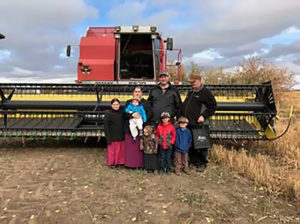How a visit to AFSC branch office helped Klassen farm grow
David and Gloria Klassen are running an organic grain farm in the Mackenzie County in northern Alberta. Coming from a farmer family, David was involved in his family’s operation, run together with his father and brother until 2012.
But even as he remained a part of the family farm, preparations were already underway for him and wife Gloria to start their own farming business: Back in 2010,
“Having a good season in 2012, I felt we could start transitioning our farm to organic,” he said. “In 2016 we had our first organic crop.”
Having expanded their farm by adding another quarter section to their land in 2017, Klassens are now eyeing a rotational crop production plan for growing organic barley, oats and peas, with their land divided into three parcels and each being seeded in rotation with one crop every year.
“Wheat, hemp, millet, lentils and faba beans also do well in our region, but we haven’t yet tried any of them,” added David.
One of the most interesting episodes in the creation of Klassens’ farming business was probably their first trip to their local AFSC branch office.
Going in for insurance, coming out with the loan
David and Gloria were mindful of the potential risks that any new agricultural business may face, and therefore, they were gathering information on how to hedge their risks and have insurance for their young business venture. The insurance requirement was also raised as a condition by another lending institution where Klassens were seeking the funds to buy their land. A natural stop in this search for insurance was AFSC’s closest branch office.
‘While at their office, I found out they (AFSC) also did farm loans,” said David.“The thing that appealed to me was the 20-year fixed interest rate for the loan.”
So the effort to find insurance to secure financing suddenly produced the solution for financing the land purchase, itself.
“I never went back to the other bank,” recalled David.
But there was more than the 20-year fixed interest rate in why Klassens felt AFSC was the right choice for them to do business with.
“What stands out for me is the way AFSC makes sure that, at the end of the day, the person taking the loan can pay the bill,” said David, noting that was different from the impressions he got from banks.
“I have recommended AFSC to friends and family and want to continue doing so for all the good AFSC has done for us. From land to our equipment to our yard, AFSC has helped us in every way to grow our farm to what it is today.”
He also had words of praise for the staff who helped him in processing the applications and completing procedures.
“The questions they ask me, the answers they provide to my questions give me the trust that we feel comfortable with,” David said.
There it seems the groundwork for a long-term business relationship based on mutual confidence has been laid.
David confirms there is much room for enhancement of that relationship.
“AFSC has good programs available. We know where to find them in time of need.”
Yevonne MacDougall, AFSC’s lending specialist who worked on Klassens’ file described working with them as “always a pleasure.”
“David and Gloria set out with a plan to make their farm a success, buying land and equipment and now this summer, they built the shop and the new house,” she said.
“Working with the Klassens and being a part of watching their family and their farm grow is a great positive reminder of why I love working at AFSC.”
